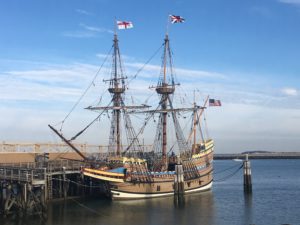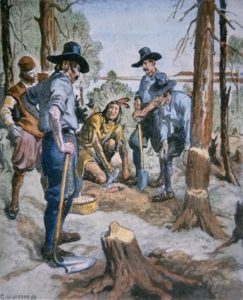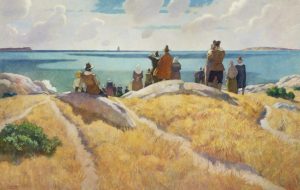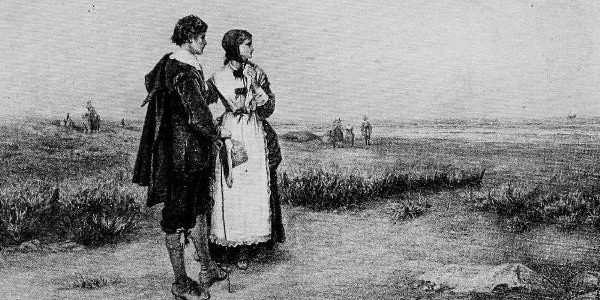William Bradford wrote under the title of “Anno 1621”: “They now began to dispatch the ship away which brought them over, which lay till about this time, or the beginning of April.” Though there are practical reasons Bradford states as to why the Mayflower had stayed so long through the winter of 1620-21, even after the women and children had begun staying on land, the departure of the ship, as the painting depicts to the left, had spiritual and emotional implications that should be remembered by all who cherish the faith, character and perseverance of the Pilgrim Church plant on the shores of Plymouth
On the practical side, Bradford wrote “The reason on their part why she stayed so long, was the necessity and danger that lay upon them; for it was well towards the end of December before she could land anything here, or they able to receive anything ashore.” Keep in mind that they did not actually land until December 11 (the 21st New Style), and after the decision of the group to settle in Plymouth, the Mayflower did not anchor in Plymouth until the 16th (26th NS), and the first common house did not get started on shore until the 25th (or January 1st NS). Only a few men were coming ashore to build the Common House, the rest were still “living” on board the Mayflower. As Bradford relates, this delay was further exacerbated; “Afterwards, the 14th of January, the house which they had made for a general rendezvous by casualty fell afire, and some were fain to retire aboard for shelter.”
Bradford notes; “The sickness began to fall sore amongst them, and the weather so bad as they could not make much sooner any dispatch…. The Governor and chief of them, seeing so many die and fall down sick daily, thought it no wisdom to send away the ship, their condition considered and the danger they stood in from the Indians, till they could procure some shelther; and therefore thought it better to draw some more charge upon themselves and friends than hazard all. The master and seamen likewise, thought before they hasted the passengers ashore to be gone, now many of their men being dead, and of the ablest of them…lay sick and weak; the master durst not put to sea till he saw his men begin to recover, and the heart of winter over.”
Now consider the spiritual and emotional implications of the return of the Mayflower and the fact that not one Pilgrim returned with her to England!
First, the ship had been their only home for eight long months, the women and children bearing the brunt of the challenges in staying in such cramped quarters without getting ashore for exercise or fresh air. Think of moving into cramed quarters. It would still be home, and memories, both good or bad, form an attachment to your only home. Further, you sold your home in England, and the buildings on shore were taking a long time to complete.
Second, it was their only tie left with their homeland. They were Englishmen, and this one boat was their connection to the civilization they had left behind. There was now no going back.
 Third, it had been the place where they had made some major decisions or discussed the results of them. Before leaving London with two ships they found their contract had been changed without their knowledge. A decision had to be made and they had little choice but to accept it. When the Speedwell sprung leaks, they had to make the decision to sell it with some returning without making the voyage. During the voyage, after the main beam cracked, they had to decide whether to continue. They also met to decide as a group to settle in Plymouth after the exploring party returned. On a personal note, William Bradford had found out he had lost his wife who drowned in the harbor. Others lost family members on the ship as well. The constant in all of this was the Mayflower ship, the place where such momentous decisions were discussed.
Third, it had been the place where they had made some major decisions or discussed the results of them. Before leaving London with two ships they found their contract had been changed without their knowledge. A decision had to be made and they had little choice but to accept it. When the Speedwell sprung leaks, they had to make the decision to sell it with some returning without making the voyage. During the voyage, after the main beam cracked, they had to decide whether to continue. They also met to decide as a group to settle in Plymouth after the exploring party returned. On a personal note, William Bradford had found out he had lost his wife who drowned in the harbor. Others lost family members on the ship as well. The constant in all of this was the Mayflower ship, the place where such momentous decisions were discussed.
Fourth, it had been the home of their church. On board they undoubtedly sung psalms, prayed together, and held formal services before landing. They now had to rely on the Lord even more as Bradford wrote “What could now sustain them but the Spirit of God and His grace? May not and ought not our fathers rightly say: ‘Our fathers were Englishmen which came over this great ocean, and were ready to perish in this wilderness; but they cried unto the Lord, and He heard their voice and looked on their adversity.’”
 Providentially, they had an alliance with the Wampanoag, ratified only weeks prior to the ship returning to England. They were also recovering in health. Bradford notes: “Afterwards they (as many as were able) began to plant their corn, in which service Squanto stood them in great stead, showing them both the manner how to set it, and after how to dress and tend it. Also he told them, except they got fish and set with it in these old grounds it would come to nothing. And he showed them that in the middle of April they should have store enough come up the brook by which they began to build, and taught them how to take it, and where to get other provisions necessary for them.” Suffice it to say, without the alliance and friendship of natives such as Squanto, they may not have survived, and some have been more tempted to return.
Providentially, they had an alliance with the Wampanoag, ratified only weeks prior to the ship returning to England. They were also recovering in health. Bradford notes: “Afterwards they (as many as were able) began to plant their corn, in which service Squanto stood them in great stead, showing them both the manner how to set it, and after how to dress and tend it. Also he told them, except they got fish and set with it in these old grounds it would come to nothing. And he showed them that in the middle of April they should have store enough come up the brook by which they began to build, and taught them how to take it, and where to get other provisions necessary for them.” Suffice it to say, without the alliance and friendship of natives such as Squanto, they may not have survived, and some have been more tempted to return.
 Though they faced more heartache with the death of their beloved Governor John Carver during April; “Shortly after, William Bradford was chosen Governor in his stead, and being not recovered of his illness, in which he had been near the point of death, Isaac Allerton was chosen to be an assistant unto him, who, by renewed election every year, continued sundry years together.”
Though they faced more heartache with the death of their beloved Governor John Carver during April; “Shortly after, William Bradford was chosen Governor in his stead, and being not recovered of his illness, in which he had been near the point of death, Isaac Allerton was chosen to be an assistant unto him, who, by renewed election every year, continued sundry years together.”
This was providential, for though their only tie with their homeland was now severed, and this remnant church plant had determined, though half their number died, to remain, in the same month, their most faithful leader and historian was elected who would remain in office for decades to follow. As Americans, we ought to be quite fond of the memory of such believers whose commitment to the future, in the face of all that was going wrong in the present, remained steadfast!







